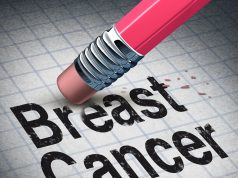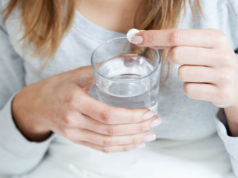 The best way to stay ahead of breast cancer is to get regular breast cancer screenings beginning at age 40 or earlier if you are considered high risk. It’s also important to perform monthly self exams to detect any lumps or changes. Although these strategies don’t prevent the disease itself, they can help catch it in its early stages before it has advanced and spread elsewhere. Mammograms typically start at age 40, but sometimes women need to start them earlier if they have certain risk factors. Check with your doctor about when you should start getting these yearly screenings.
The best way to stay ahead of breast cancer is to get regular breast cancer screenings beginning at age 40 or earlier if you are considered high risk. It’s also important to perform monthly self exams to detect any lumps or changes. Although these strategies don’t prevent the disease itself, they can help catch it in its early stages before it has advanced and spread elsewhere. Mammograms typically start at age 40, but sometimes women need to start them earlier if they have certain risk factors. Check with your doctor about when you should start getting these yearly screenings.
Besides these screenings, though, is there anything else you can do to lower your risk of getting breast cancer? While researchers aren’t able to say for certain what’s always the cause, they have evidence that certain risk factors and lifestyle choices do contribute to the development of the disease. Take a look at these tips that could help you to decrease your risk.
- Maintain a healthy weight. Keeping your body fat down can decrease your risk of breast and many other cancers, particularly after you go through menopause. Exercising and keeping up good nutrition can help you to accomplish this goal.
- Exercise. Being physically active can help you to maintain a healthy weight. Try to aim for at least 30 minutes of moderate physical exercise each day.
- Keep up a healthy diet. Eat a variety of fruits, vegetables, and whole grains, and stay away from alcohol and foods high in sugar and fat. Maintaining good nutrition can help you to keep breast and other cancers away. While drinking alcohol or indulging in desserts can be okay on occasion, try to keep these things to a minimum.
- Quit smoking. Smoking and using tobacco wreaks havoc on your health, and it is directly related to an increased risk of heart disease, stroke, and at least fifteen kinds of cancer, including breast cancer. Stay smoke-free, and keep smoke out of your home in order to protect your loved ones from the harmful effects of secondhand smoke.
- Breastfeed your baby. Although it’s not possible for every woman, breastfeeding for at least a year can help reduce your risk of breast cancer. It also provides amazing health benefits for your baby, including a strong immune system!
- Avoid birth control pills. Birth control pills can be very beneficial for some women, as long-term use can lower your risk of ovarian, colon, and uterine cancers, as well as protecting against unwanted pregnancies. However, they can also increase a woman’s risk of breast cancer, stroke, and heart attack. If breast cancer runs in your family, it might be best to avoid these pills. Talk to your doctor or gynecologist to find out what’s best for your particular situation.
- Don’t take post-menopausal hormones. Long-term use of post-menopausal hormones can cause many chronic diseases, including osteoporosis and heart disease. Although research has shown that there are both positive and negative effects on your health, it’s clear that estrogenic and estrogen-plus progestin hormones can increase your risk of breast cancer. If you do take these hormones, make sure to stop them after a short time. It’s best to talk to your doctor or gynecologist when considering the benefits and drawbacks of these hormones.
- Ask your doctor about Tamoxifen and Raloxifene. These prescription drugs can lower the risk of breast cancer in women who are at high risk of getting the disease. They do have powerful side effects, so it’s best to consult your physician about whether they are right for you.




























